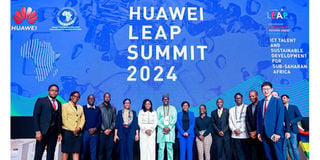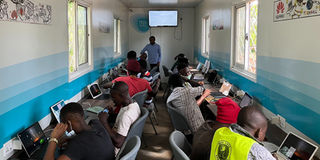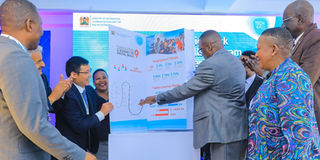LEAP: New plan to train additional pool of digital talents
Sponsored by Huawei

Kenyan delegation at the LEAP Summit 2024.
Huawei’s LEAP programme invests in global resources to meet all local digital talent needs, to help foster digital leadership, skilled ICT workforce, young digital talent pool, and digitally literate citizens. This year, Huawei announced a new plan to train an additional 150,000 talents in Sub-Saharan Africa over the next three years.
The plan comes on top of the ICT leader’s initial goal to equip over 100,000 people in the region with digital skills by 2025. Huawei has already exceeded its initial goal by 120 percent, 10 months ahead of schedule, training over 120,000 individuals over the past 26 months. Both announcements were made at the LEAP Summit 2024: ICT Talent and Sustainable Development for Sub-Saharan Africa.
LEAP stands for Leadership, Employability, Advancement and Possibility.
During the LEAP Summit 2024, participants had a chance to take part in a content creation competition by documenting their one week stay in China through photos and videos. Here, the Kenyan team took the chance to shine bright, and we had Sylvia Jebet and Danton Kipkurui secure Second and Third place respectively.
Huawei began its Leadership, Employability, Advancement and Possibilities (LEAP) digital skills development programme in Sub-Saharan Africa in 2022. The programme aims to foster a strong digital leadership and skilled ICT workforce, build a digital talent pool and promote digital literacy among citizens. It includes a wide range of activities from ICT training and certification courses, to government digital capacity building and ICT skills competitions.
DigiTruck
Launched in 2019 in Kenya under Huawei’s TECH4ALL initiative, the DigiTruck is a mobile, solar-powered classroom equipped with Internet connectivity, laptops, and smartphones.
Converted from a used shipping container mounted on the back of a truck, the DigiTruck travels to remote communities in Kenya, providing free training in digital skills to youth, empowering them to participate more fully in the digital economy. Each class in the truck lasts 40 hours, and provides training in digital skills and soft skills like starting an online business, writing resumes, and applying for jobs online.

Students being trained inside the DigiTruck in Kenya.
A recent survey of 800 of the 5,000+ youth trained over four years revealed significant, positive, tangible outcomes for beneficiaries.
The DigiTruck takes training to the doorstep of those who are in need of this digital skills training.
Back in 2019 as the DigiTruck was being launched in Kenya, it was crucial for us to note the gaps in tech that were affecting the youth and barring them from accessing the internet. These included lack of interest in the internet, lack of knowledge on how to use the internet, and even lack of the devices to access the internet with. Looking at these, we decided to come up with the truck, which so far has been to more than 30 counties across Kenya, training more than 5,000 youth in those rural areas.
In the programme, we have had close to half of the trainees being women and girls. In Garbatulla, Isiolo county, we were able to have sessions that were solely for women training due to the cultural restrictions in the area. That remains one of the most active sessions the truck has had.
Back in 2020 when the truck visited Bomet, we also had a chance to train one student who had a hearing impairment. To say the least, she enjoyed the classes, underscoring the importance of having an inclusive training in the truck. This has been our aim since 2019. So far, it has been going on great.

Launch of the DigiTruck Impact Report in April 2024.
The truck aims to tour all the 47 counties in Kenya, delivering the much needed digital skills to those in need. This will keep being possible through the help of our partners, including the Ministry of Information, Communication and The Digital Economy, Ministry of Youth Affairs, Creative Economy and Sports, Safaricom, Computers for Schools Kenya, National Government Affirmative Action Fund, National Youth Council, and ICT Authority.


